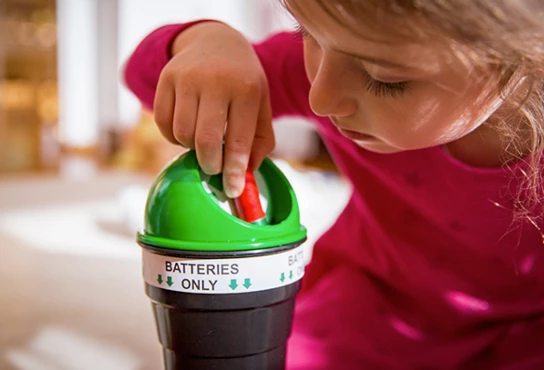Zinc Carbon vs. alkaline batteries
Which batteries should you use in low-energy devices like a TV remote control or a clock? And which ones are best suited to your DECT phone? Is it necessary to use zinc batteries, or are alkaline cells preferable? But what is the primary distinction between the two technologies? We’ll show you the differences between Zinc Carbon batteries and alkaline batteries.

What are they made of?
The primary distinction between a zinc battery and an alkaline battery is the electrolyte used in both batteries. Zinc batteries are mostly made of ammonium chloride, whereas alkaline batteries are made of potassium hydroxide. However, these technical specifications don't say much about how the batteries are used. As a result, we'll now take a closer look at the capacity, benefits, and applications of zinc and alkaline batteries.
What are the benefits of an alkaline battery?
Alkaline batteries have a higher energy density and a longer shelf life (the amount of time a battery can be stored without losing any capacity). Extensive research and development have resulted in three distinct technologies in the Alkaline Battery Technology. To begin with, the Panasonic Alkaline batteries have Anti-Leak Protection to prevent damage to appliances. The cause of leakage is the changing chemistry of the battery and the gas produced when the battery discharges.
In addition, a specially designed coating inside the batteries reduces contact resistance for increased reliability. Finally, the Alkaline cells have an Extra Power Formula that allows them to last longer in high-drain devices.
Suitable devices for alkaline batteries
Because alkaline batteries have more energy than zinc batteries, they should be used for appliances like toothbrushes, toys, and game controllers.
What are the benefits of a Zinc Carbon battery?
Panasonic Zinc Carbon batteries are widely used all over the world. They are made of simple, proven, and dependable technology, and they have an excellent price-to-quality ratio. For low-drain devices, the battery is cost effective per hour.
Suitable devices for Zinc Carbon batteries
These batteries provide a dependable source of power for low-energy appliances. Because of their low energy consumption, zinc batteries should be used in appliances such as television remote controls, clocks, smoke detectors, and torches. This will allow you to use the appliances for a longer period of time while spending the same amount of money.
The difference in capacity
Both batteries have different capacities, as expected. An alkaline battery has more energy than a zinc battery due to its composition. The only implication is that both batteries should be used in separate applications.
Other types of batteries
Do you use any other applications besides the ones listed above? Panasonic offers a wide range of rechargeable batteries that are ideal for your devices. Here is an overview of the rechargeable batteries in our range.
EVOLTA
The rechargeable EVOLTA battery is ideal for products such as flash cameras, toy cars, and even game controllers, which are A battery for frequent users in A battery for frequent users. This rechargeable battery is intended for high-power applications (minimum capacity of 2450 mAh for AA batteries and 900 mAh for AAA batteries) and retains up to 80% of its original capacity after a year of storage. Panasonic EVOLTA cells are also resistant to cold weather, making them ideal for using a camera in temperatures as low as -20°C.
A battery for occasional users
Occasional users should use another Panasonic Rechargeable Ready to Use battery. This is the perfect battery for telephones and devices with a minimum of 1000 mAh. You can also use them in a computer mouse, remote control and DECT-phone.
A battery for frequent users
Are you a frequent battery user? Then the Panasonic Ready to Use (Rechargeable) battery with min. 1900 mAh (AA) or 750 mAh (AAA) is ideal. We recommend using these batteries in flashlights, tooth brushes, computer mice, and remote controls.

Contact



